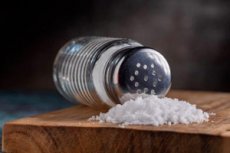
加州大学旧金山分校的一项研究发现,每日盐摄入量的变化可能是湿疹爆发的原因。
加州大学旧金山分校(UCSF)研究人员的一项研究表明,高钠饮食可能会增加患湿疹的风险。他们发现,每天仅多摄入一克钠(相当于一个巨无霸的钠含量),湿疹发作的可能性就会增加22%。
湿疹,又称特应性皮炎,是一种导致皮肤干燥、瘙痒的慢性疾病。它是最常见的皮肤病之一,影响着美国超过3100万人,每10人中就有1人经历过湿疹。
近年来,湿疹变得越来越普遍,尤其是在工业化国家,这与环境和饮食等生活方式因素有关。
大多数人以盐的形式摄入钠,这会增加患高血压和心脏病的风险。科学家最近发现,钠储存在皮肤中,这可能在湿疹炎症中发挥作用。
限制钠的摄入量可能是湿疹患者控制病情的简单方法。
“大多数美国人吃的盐太多,可以安全地将摄入量减少到推荐水平,”加州大学旧金山分校皮肤病学副教授、发表在《JAMA 皮肤病学》上的这项研究的主要作者 Catherine Abuara 医学博士说。
“湿疹发作对患者来说可能很困难,”阿布拉说道,他也是加州大学伯克利分校公共卫生学院的流行病学助理教授,“尤其是当他们无法预料并且不知道如何避免湿疹时。”
在横断面研究中,研究人员分析了英国生物银行中超过 215,000 名年龄在 30 至 70 岁之间的人的数据,包括尿液样本和电子健康记录。
他们可以通过尿液样本确定每个人的钠摄入量;他们还可以通过处方代码了解人们是否被诊断出患有特应性皮炎,以及其严重程度。
他们发现,24 小时内尿液中排出的钠每增加一克,被诊断患有湿疹的几率就会增加 11%,成为活跃病例的几率就会增加 16%,严重程度增加的几率就会增加 11%。
随后,他们作为国家健康和营养检查调查的一部分,对美国 13,000 名成年人进行了研究,发现每天只多摄入一克钠(约半茶匙盐)就会使患湿疹的几率增加 22%。

